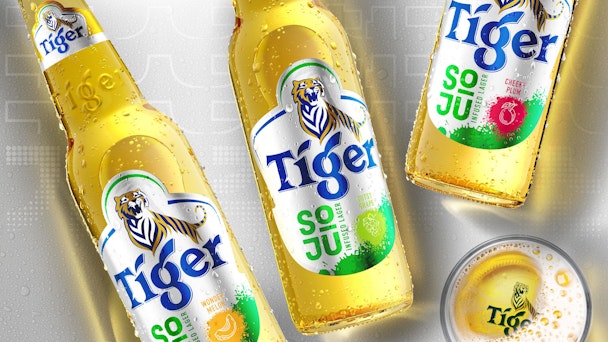How programmatic DOOH poured success into Tiger Beer's global campaign
To launch its new Tiger Soju Infused Lager, the beer brand turned to programmatic digital out of home and the support of Dentsu Red Star and Tradedesk. The successful campaign went on to scoop the Use of Programmatic award at The Drum Awards for Out of Home. Here is the award-winning case study.

Tiger Beer sought to blaze a trail with the introduction of Tiger Soju Infused Lager in Singapore, making the city-state the first market in the world where its unique ready-todrink beverage was available. This endeavour transcended mere product introduction; it signified Tiger’s strategic move to reappraise the longstanding beer brand, ushering it into a new era by going beyond beer and engaging with a more youthful demographic.
The campaign objective was clear: create a buzz around Tiger Soju Infused Lager, solidify awareness of the drink among young adults, especially females and occasional drinkers, and generate sales.
However, the path to establishing this unique drink wasn’t devoid of obstacles. The campaign was set to launch after Lunar New Year when beer sales traditionally slump, as most people make their purchases during the festive period.
Furthermore, Tiger Soju Infused Lager is not your run-of-the-mill beer. Taking inspiration from the prominence of Korean popular culture and the popularity of soju, as well as Millennial and Gen Z consumers’ pursuit for innovative products, Tiger’s latest innovation goes beyond lager with a range of natural flavours and soju infusions. It ventured into uncharted territory, presenting a taste profile many consumers were not yet to acquainted with. Tiger meticulously perfected the flavours through thorough research to understand the market dynamics and multiple rounds of revisions. Being the first beverage of its kind in the market, Tiger wanted to ensure that it set the right standards with an impactful launch.
The brand also wanted to understand if digital-out-of-home (DOOH) advertising would drive incremental sales for its new drink, particularly as its products are largely sold via distributors and sales can’t be made directly via Tiger’s website. Historically, it had been difficult for Tiger to measure the effectiveness of out-of-home (OOH) advertising beyond awareness due to a lack of retail measurement partners in the market.
STRATEGY: Tiger, together with its agency, Dentsu Red Star, decided to launch a multi-channel programmatic campaign to address the key objectives and challenges. Running from 17 April to 31 May 2023, the campaign included DOOH and display ads that were purchased and activated via The Trade Desk, a programmatic demand-side platform (DSP).
By partnering with The Trade Desk, Tiger also took advantage of its unique retail data partnership with Singapore’s largest supermarket chain, FairPrice Group. FairPrice’s first audience-and-measurement partnership with a DSP enabled Tiger to track in-store and online sales generated by its DOOH and display ads – known as closed-loop measurement. It also allowed the brand to reach high-value FairPrice customers on the open internet, beyond traditional OOH or FairPrice-owned media platforms. This marked the first time globally that a DOOH campaign had been measured with a retail measurement solution.
Tiger and Dentsu Red Star executed their multi-channel programmatic campaign strategy by:
Activating programmatic DOOH ads on screens via The Trade Desk’s DSP to showcase Tiger Soju Infused Lager and its endorsement by K-pop superstar G-DRAGON. These screens were strategically located near major retailers in central and suburban areas of Singapore, which helped Tiger reach its target audiences.
Activating display ads via The Trade Desk’s DSP and using behavioural and contextual audience targeting strategies, as well as FairPrice audience segments, to reach the right consumers. These included people who had purchased competitor beer brands in the previous 12 months, and those who had purchased Tiger products in the previous three months.
Retargeting people who were exposed to a DOOH ad with display advertising that drove people to FairPrice’s website. This was achieved using data gathered from mobile IDs and The Trade Desk DSP’s retargeting capabilities.
Using FairPrice’s retail measurement solution via The Trade Desk’s DSP to determine the impact of DOOH and display advertising on in-store and online sales. Conversion data flowed into the DSP daily, enabling Tiger and Dentsu Red Star to not only measure the effectiveness of these channels, but also different audience targeting strategies (i.e. behavioural, contextual and FairPrice audience segments) in the days after Tiger Soju Infused Lager’s initial launch.
RESULTS: The campaign’s strategically placed DOOH ads reached approximately 35 per cent of Singapore’s population. This helped Tiger rapidly grow awareness of Tiger Soju Infused Lager among its target audiences.
The DOOH ads also had a significant positive impact on sales of Tiger’s new product, with those located near railway stations in residential areas of Singapore generating the highest number of conversions. These stations are part of Singapore’s Mass Rapid Transit system, which is the principal mode of public transport for almost 2.75 million people every day.
In addition, people who purchased Tiger Soju Infused Lager via FairPrice after seeing DOOH and display ads had an average basket size that was 31 per cent higher than those who only saw a display ad.
Retargeting people who were exposed to a DOOH ad with a display ad increased audience engagement, which indicated a higher consideration to purchase. This audience had a 42 per cent higher click-through rate than the display aggregate, as well as a 29 per cent lower cost per click.
Furthermore, people who saw a DOOH ad and were then retargeted with a display ad had a 3.7 times shorter conversion cycle compared to those who were only exposed to a display ad.
Tiger’s display ads delivered a 1,873 per cent return on ad spend, outperforming the benchmark from past social media campaigns by 15.7 times. Furthermore, their cost per action was 15 times lower than the campaign benchmark and 158 per cent lower than the second phase of the campaign, which ran on display only in August 2023. These results were largely driven by FairPrice’s high-value audience segments, which proved to be the most effective display audience targeting strategy for Tiger. This strategy achieved the highest return on ad spend (5,730 per cent) and the lowest cost per action.
Overall, the campaign drove a 1.32 times increase in sales of Tiger Soju Infused Lager between 17 April and 31 May 2023.
The campaign is a ground-breaking example of how programmatic DOOH advertising can be used to boost both awareness and sales. The Trade Desk’s unique retail data partnership with FairPrice enabled Tiger to reach the right audiences with precision. It also enabled the brand to measure the effectiveness of its DOOH ads in a way that had never been done before – closing the loop between screens and sales.
The taste of Tiger Soju Infused Lager is now a familiar one for many young adults in Singapore. It has further established Tiger’s credentials as a progressive brand that is always looking to unlock new experiences for consumers.

